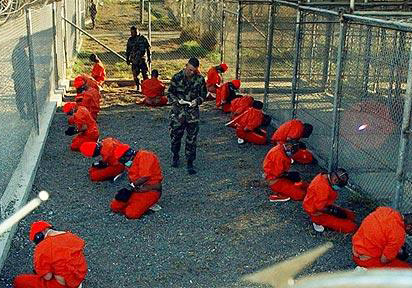
May 31, 2018 | News
The European Court of Human Rights has found that Romania and Lithuania violated the human rights of Abd al-Rahim al-Nashiri and Zayn al-Abidin Muhammad Husayn, also known as Abu Zubaydah.
The court underlined both countries’ complicity in the ill-treatment of the pair while they were held in US secret detention facilities in these countries.
The judgments are a key milestone in holding European governments accountable for their involvement in illegal CIA activities in the aftermath of the 11 September 2001 attacks.
“The US could not have operated the rendition and secret detention programme without its European allies. Today’s landmark rulings break the conspiracy of silence that has surrounded the presence of these secret sites in Lithuania and Romania, and publicly underlines European governments’ widespread complicity,” said Julia Hall, Amnesty International’s expert on counter-terrorism and human rights.
“The rulings are an important milestone of accountability for victims of these flagrantly illegal practices.”
Al-Nashiri and Abu Zubaydah, currently in the US Guantánamo Bay detention facility, were subjected to enforced disappearance and torture as part of the rendition programme.
The European Court held that both governments are responsible for the men’s unlawful detention and ill-treatment in CIA ‘black sites’.
A December 2014 report by the US Senate Select Committee on Intelligence included details of al-Nashiri and Abu Zubaydah’s torture, but the names of the countries where people were held in secret sites were redacted. Courts in the USA have declined to hear cases related to the CIA operations deferring to US government claims that information about the sites should be protected as “state secrets”. There has been virtually no accountability for such abuses in the US.
“These rulings are a further step towards establishing the truth about European complicity in renditions and secret detentions, and holding European states accountable for their involvement. But the Lithuanian and Romanian governments were not alone. Many other European governments colluded with the US to illegally transfer, ‘disappear’ and torture people during rendition operations and must also be held accountable,” said Róisín Pillay, Director of the International Commission of Jurists’ (ICJ’s) Europe and Central Asia Programme.
Amnesty International and ICJ intervened in both proceedings (see Al-Nashiri and Abu Zubaydah). The organizations submitted evidence, context and expert opinion in light of precedents within the court and elsewhere.
On 13 March 2018, at the US naval base in Guantánamo Bay, Abd al-Rahim al-Nashiri began his 800th week in US custody. Abu Zubaydah is also imprisoned there, but has not been charged with any crime.
Amnesty International and ICJ have repeatedly called for the closure of the facility and the fair trial or release of those detained.
The judgments follow previous rulings against Poland, Italy, and the former Yugoslav Republic of Macedonia for their roles in the illegal rendition, torture, including waterboarding and mock execution, and enforced disappearance of alleged suspects at the hands of the CIA.
The Judgment
Based on numerous expert opinions and a 2014 US Senate Select Committee on Intelligence report on the CIA programme, the Court identified detention facilities “Detention Site Black” in Romania and “Detention Site Violet” in Lithuania.
The Court also held that both governments violated the prohibition on non-refoulement by allowing the men’s unlawful rendition to other countries despite the risk of further violations of the prohibition on torture and other ill-treatment.
In addition to the complicity in their unlawful detention and ill-treatment while detained in their respective countries, the Court held that both governments violated the prohibition on non-refoulement, which obliges states not to return anyone to a territory where they would be at risk of persecution or other serious human rights violations, by allowing the men’s unlawful rendition to other countries.
It found that Romania had violated its human rights obligations by assisting Al-Nashiri’s transfer out of Romania, despite the risk that he would face a flagrant denial of justice upon prosecution in a US Military Commission trial at Guantanamo Bay.
It also found that Romania violated Al-Nashiri’s right to life by facilitating his transfer despite the substantial and foreseeable risk that he would be facing the death penalty.
In both cases, the court held that neither state satisfied their obligation to carry out an effective investigation.
Contact
Olivier van Bogaert, Director Media & Communications at ICJ, t: +41 22 979 38 08 ; e: olivier.vanbogaert(a)icj.org
Europe-Renditions Rom & Lit-News-press release-2018-ENG (full story in PDF)
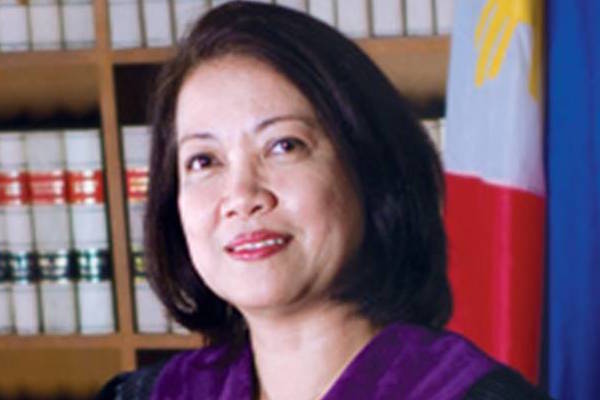
May 30, 2018 | News
As Chief Justice Maria Lourdes Sereno filed a motion today to reconsider the Supreme Court’s 11 May 2018 decision to remove her from the Court, the ICJ expressed its grave concern that the proceedings in the case had contributed to an overall deterioration in the rule of law in the country.
Sereno’s removal comes on the heels of a series of public statements by President Rodrigo Duterte attacking the Chief Justice, including direct threats to seek her removal from the Court.
The ICJ and other national and international observers have repeatedly and publicly condemned these attacks.
Her removal, through the contrivance of a judicial ruling by a sharply divided Court, adds to the perception that the government institutions are unable or unwilling to safeguard the rule of law, and will attack the institutions that protect it.
“Preserving the independence of the judiciary in the Philippines is crucial at a time when the government is credibly alleged to have been engaged in widespread and systematic human rights violations, amounting to crimes under international law,” said Frederick Rawski, Asia Pacific Director for the ICJ.
“Given the perception of political interference and the potential impact of this case on the credibility of the judiciary as a whole, it is imperative that the Court swiftly and fairly consider the Chief Justice’s motion for reconsideration,” he added.
The removal decision came in response to a quo warranto petition filed by the Solicitor General, the government’s foremost counsel.
The petition sought to nullify her appointment on the grounds that she had failed to comply with disclosure requirements, despite the fact that her qualifications had already been certified as sufficient by the Judicial and Bar Council when her name was included in the short-list submitted to the president for consideration.
The decision superseded ongoing impeachment proceedings in the Congress.
The ICJ raised concerns that the decision could open the floodgates to similar attacks, not only against members of the Court, but to members of the judiciary and other bodies, such as the Philippine Commission on Human Rights.
It called on the Supreme Court to take care to ensure that any proceedings are conducted in line with the highest standards of judicial ethics, as reflected in the international standards such as the Bangalore Principles of Judicial Conduct.
The ICJ also reminded the government of the Philippines that under international standards – including the UN Basic Principles on the Independence of the Judiciary – the judiciary, including individual judges, must be able to conduct itself without “improper influences, inducements, pressures, threats or interferences, direct or indirect… for any reason.”
It is a responsibility of both the judiciary and the political branches of government to ensure that this principle is respected.
Contact
Emerlynne Gil, Senior International Legal Adviser for Southeast Asia, t: +662 619 8477 (ext. 206) ; e: emerlynne.gil@icj.org
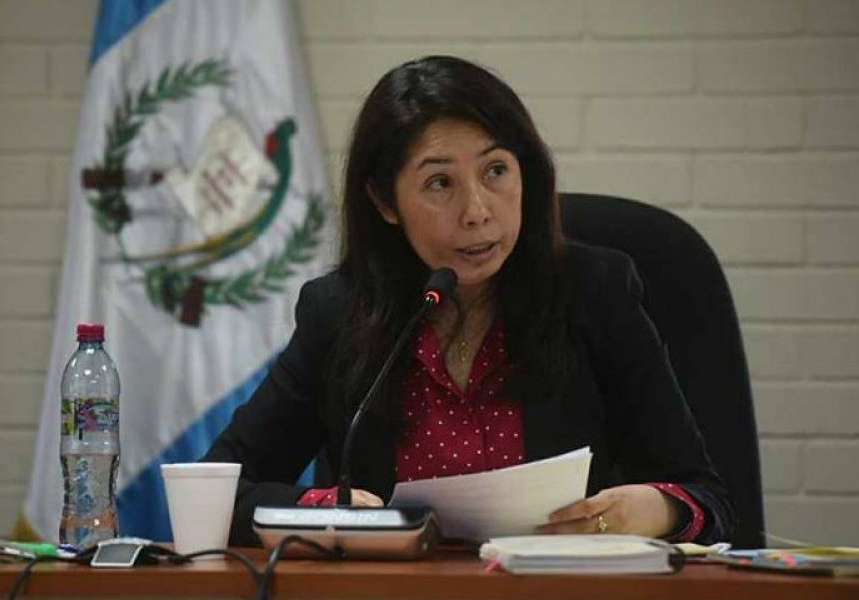
May 29, 2018 | News
The ICJ is deeply concerned about the recent attacks against Judge Erika Aifán that put judicial independence in Guatemala at imminent risk. Judge Aifán has always been upright and honest in her rulings, which she bases on sound principles of the rule of law.
Ramon Cadena, Director of the Central American office of the ICJ stated today: “We must support Judge Aifán because the guarantee of judicial independence is under serious threat.”
“Judge Aifán is an honest and brave Judge presiding over emblematic cases, which could be put in jeopardy if the legal actions against her proceed,” he said.
“It is totally unacceptable that a Court imposes a fine against a professional carrying out their duty. The Judges of the Third Court who imposed this fine should be investigated by the Public Ministry on account of their actions, which constitute an attack on judicial independence,” he added.
The ICJ firmly believes that the independence of judges is essential to uphold the rule of law so that public officials can effectively guarantee access to justice for victims of human rights violations.
The Inter-American Commission of Human Rights (IACHR) has established that “the independence of the judicial power has been recognized as a general principle of law and enshrined in many international treaties”.
For that reason, and with reference to the Guatemalan Constitution and international human rights standards, the ICJ considers that the Guatemalan Supreme Court should take an active role in the defence of judicial independence and in this specific case concerning Judge Aifán.
The ICJ also urges the UN Special Rapporteur on the Independence of Judges and Lawyers to visit the country.
The ICJ also considers that the Guatemalan Prosecutor for Human Rights should submit the case to the IACHR so that that Commission can grant preventive measures to Judge Aifán and investigate this flagrant violation of judicial independence.
The ICJ also requests that the IACHR intervenes in the present situation.
The ICJ considers that the motives for the attacks against Judge Aifán are because she is currently presiding over emblematic cases in the fight against impunity and corruption.
Groups who are interested in maintaining a situation of impunity wish to see her removed from her position.
The ICJ recalls that a judge can only be removed from office for reasons established by law, following a disciplinary process that complies with the basic guarantees of a fair trial; or when a judicial officer has completed the term of their mandate.
Neither of these conditions is met in the case of Judge Aifán. Therefore, the ICJ can only conclude that the attacks against her are attacks on the independence and impartiality of the judiciary as a whole.
It is self-evident that the independence of every judicial body is indispensable for the fulfilment of fair trial standards without which the right of access to justice is undermined.
Furthermore, without judicial independence, people lack confidence in the courts or are fearful and therefore refrain from taking cases to justice.
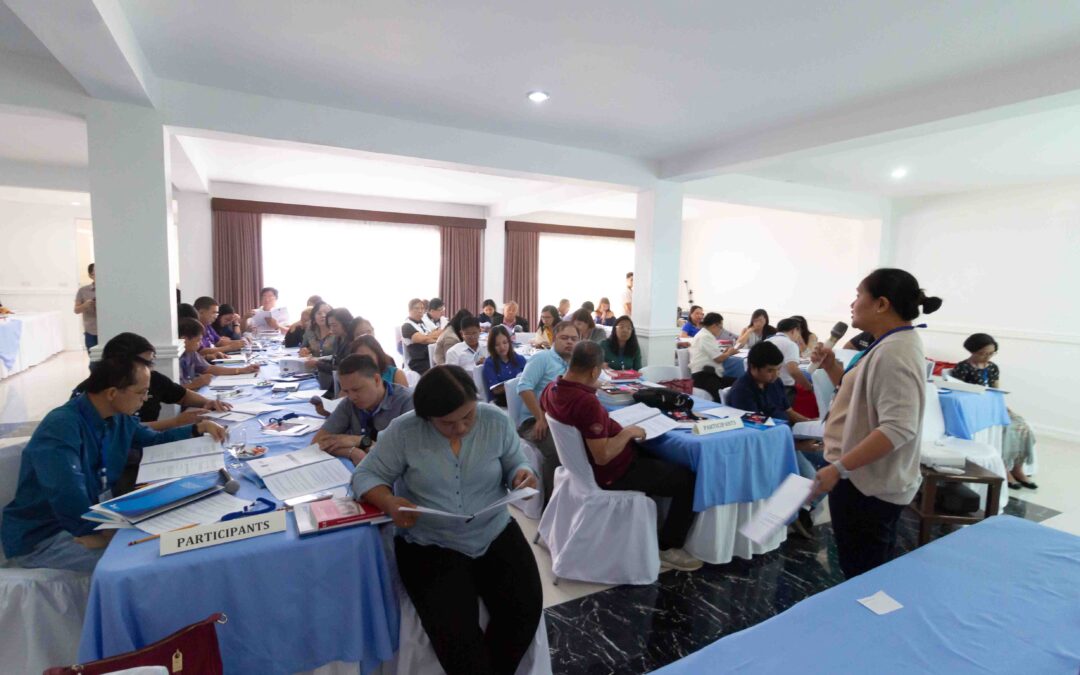
May 26, 2018 | News
Today, the ICJ and the Integrated Bar of the Philippines (IBP) concluded a two-day workshop on eliminating gender discriminatory attitudes and behaviours towards women with a commitment to step up efforts on the protection of rights of women in the country.
Participants at the workshop were lawyers from IBP’s legal aid committees from the Eastern and Western Visayas Regions.
The workshop was held in Bohol from 25 to 26 May 2018.
“Legal aid providers are at the frontline of assisting women in accessing justice,” said Frederick Rawski, ICJ’s Regional Director for Asia and the Pacific.
“It is critical that they are able to immediately detect discriminatory conduct against the women they are assisting and help in eliminating such discrimination,” he added.
Recourse to gender stereotypes in the administration of justice widespread in the Philippines and they impact women’s access to justice.
Participants at the workshop noted, in this respect, examples such as the belief that women, unlike men, are weak in the physical and cognitive sense, and the ‘virtuous-or-good-woman-versus-bad-woman-or slut’ stereotype that are still reflected in law and court decisions in Philippines.
It was noted that the UN Committee on the Elimination of Discrimination against Women had emphasized that “stereotyping and gender bias in the justice system have far-reaching consequences for women’s full enjoyment of their human rights.”
The discussions during the two-day workshop also focused on strengthening the capacity of legal aid providers to further enhance access to justice of women whose loved ones and relatives had been extra-judicially killed.
Atty. Abdiel Dan Fajardo, National President of the IBP addressed the ongoing extrajudicial killings and culture of impunity in the Philippines that affects women particularly.
He said: “Without combatting the culture of impunity, legal aid lawyers cannot enhance access to justice for women. Therefore, it is high time to bolster the knowledge and awareness of legal aid lawyers in combatting impunity that affect women and their children.”
It was recalled that the remarks of the UN Special Rapporteur on extrajudicial, summary, or arbitrary executions, Agnes Callamard, in her report to the Human Rights Council in 2017, stressed that women are particularly affected by the extrajudicial killing of their partners and other family members.
The Special Rapporteur noted that in the Philippines, since majority of the victims are men, their female partners, “by virtue of their gender-based roles, are left to confront the associated stigma, fear, insecurity and economic deprivation, in addition to the burdens of identifying and burying their dead loved ones and seeking justice.”
At the Bohol workshop, ICJ and IBP also signed a Memorandum of Agreement to commence joint work on strengthening the IBP’s National Center for Legal Aid (NCLA).
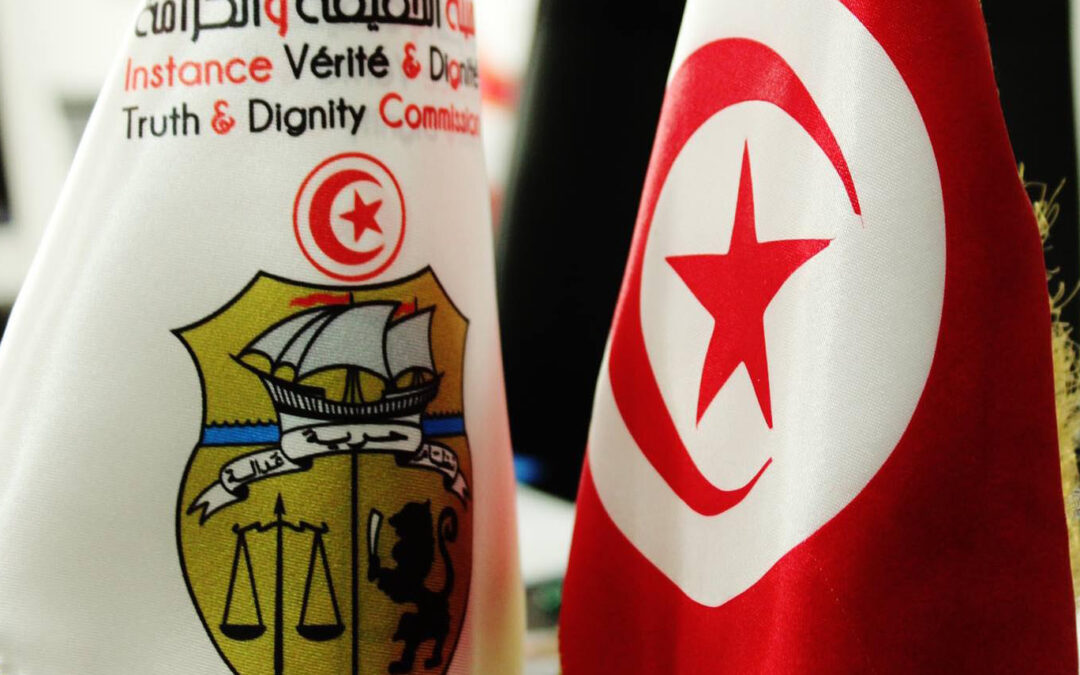
May 25, 2018 | News
The ICJ today called on the Tunisian Parliament to reverse its decision of 26 March 2018 and allow the Truth and Dignity Commission (IVD) to carry out its mandate for at least another year.
The IVD should be in the position to finalize its investigations of past serious human rights violations in the country and, when appropriate, refer cases to the Specialized Criminal Chambers (SCC), the ICJ added.
Since its decision, the Parliament has not considered or adopted any measures to address the legal and practical consequences, including how incomplete investigations by the IVD will be handled, how other investigations will be transferred to the SCC and by whom, how evidence will be preserved and protected, how the documents and the material gathered by the IVD will properly be archived, and what would happen if the IVD were unable to complete the drafting of the final report.
The initial four-year term of the IVD ends on 31 May 2018.
“It’s absolutely irresponsible for the Tunisian Parliament to thwart the whole transitional justice process and curtail the work of the IVD without providing any path forward,” said Said Benarbia, ICJ MENA Director.
“As one of the three branches of government, the Parliament must abide by Tunisia’s obligations under international law to establish the truth about past human rights violations, bring the perpetrators to account, and provide victims with effective remedies and reparation,” he added.
The March decision runs counter to all these obligations.
It denies the rights of victims, and broader society, to know the truth, including about the circumstances and reasons that led to decades of serious human rights violations in the country.
The IVD has not been able to finalize its investigations or produce its final report.
It also shields those responsible from criminal accountability. Only eight cases have so far been referred by the IVD to the SCC.
The fate of cases that have been investigated but are not referred before 31 May 2018 remains unclear. The IVD reportedly received some 62’712 complaints.
“The Parliament is abdicating its responsibility to respect and protect victims’ rights,” Benarbia said.
“Instead of playing cynical political games that can only foster impunity, the Parliament should reverse its decision and remove all the obstacles that might impede the IVD’s work in ensuring accountability for past abuses, ” he added.
Contact
Said Benarbia, Director of the ICJ Middle East and North Africa Programme, t: +41798783546, e: said.benarbia(a)icj.org
Background
Under the 2013 law on transitional justice, the IVD initially had a four-year term, with the possibility of renewal for a single additional year, on the basis of a reasoned decision by the IVD.
The 2013 law provided that the IVD’s decision on renewal should be submitted to the Parliament.
The law is however silent as to whether the submission of the IVD decision was simply a matter of notification, or required approval of Parliament to be effective.
In any event, 68 members of the Parliament voted on 26 March against extending the term of the IVD for another year.
Under its bylaws, for decisions of Parliament to be valid they must be adopted by at least 72 of its members.
The apparent lack of quorum for the Parliament’s 26 March decision has only introduced more uncertainty and confusion, further complicating the position for the IVD and others, including most notably the victims themselves.
On 24 May 2018, the IVD and the Minister in charge of relations with constitutional bodies, civil society and human rights issued a joint statement reiterating Tunisia’s commitments to the transitional justice process as provided by the Constitution.
In the statement, the IVD was requested to transfer all cases concerning serious human rights violations to the SCC, to establish criteria on the basis of which reparation for victims will be provided, to establish compensation criteria for the Victims Fund, and to send the final report to the President of the Republic, the President of the Parliament and the President of the Government.
Tunisia-IVD Parliament-News-2018-ARA (full story in Arabic, PDF)
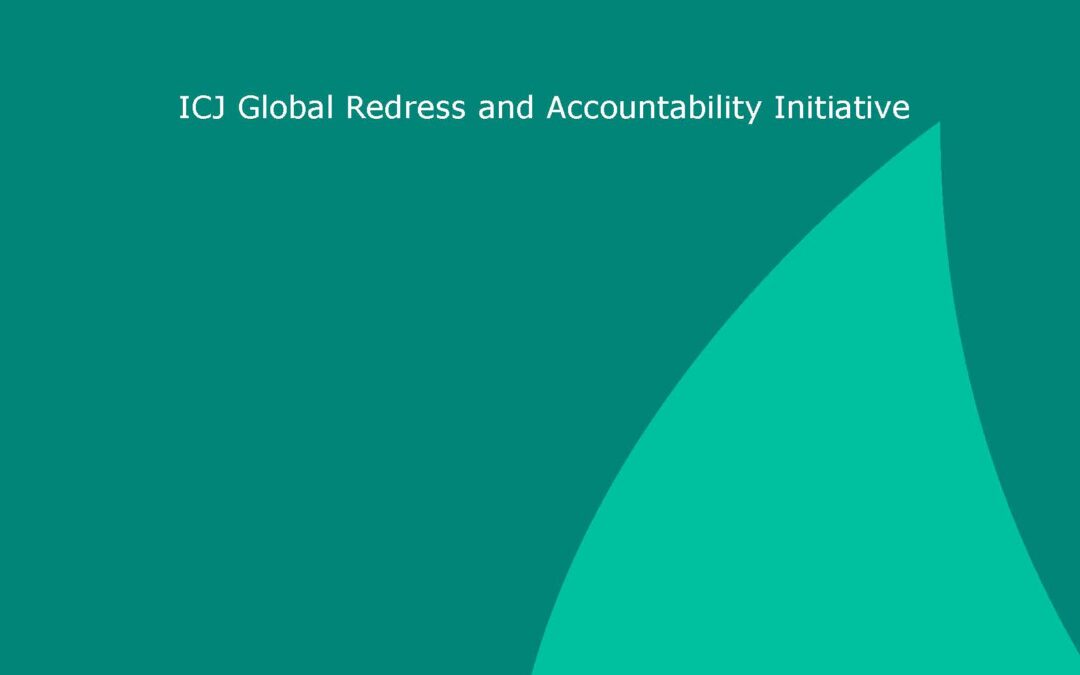
May 24, 2018 | News, Publications, Reports, Thematic reports
The widespread occurrence of sexual and gender-based violence (SGBV) in Swaziland requires prompt action to enact the Sexual Offences and Domestic Violence Bill, says the ICJ in a report released today.
The ICJ’s report found that discriminatory practices based on customary laws and traditional beliefs undermine equality between men and women and contribute to an environment in which SGBV is at crisis point in the country.
“As the Senate of Swaziland deliberates over the Sexual Offences and Domestic Violence Bill, it must recall that enactment of the Bill is an essential step in complying with recommendations of the UN Human Rights Committee and CEDAW Committee and as a means of discharging the commitments made by His Majesty’s Government during the 2016 Universal Periodic Review,” said Arnold Tsunga, Director of the ICJ Africa Regional Programme.
In earlier submissions to the Senate of Swaziland, the ICJ noted that enactment of the Bill is a matter required of the Kingdom of Swaziland pursuant to its international human rights law obligations, including those arising from the Africa region, to criminalize and sanction the perpetrators of SGBV.
His Majesty’s Vision 2022, the aims and targets of the Deputy Prime Minister’s Office and Swaziland’s consensus in the adoption of the 2030 Agenda for Sustainable Development reinforce compliance with those obligations.
The Sexual Offences and Domestic Violence Bill 2015, first drafted over ten years ago, has still not been passed into law, including because there is a perception that some of its provisions will infringe Swazi law and custom.
“Legislative and policy reform is needed as is the enhanced technical capacity and commitment of justice actors and policy makers to combat domestic and sexual violence,” Tsunga added.
Contact
Arnold Tsunga, Director, ICJ Africa Regional Programme, t: +27.73.131.8411; e: arnold.tsunga(a)icj.org
Alex Conte, ICJ Global Redress and Accountability Initiative, t: +41.79.957.2733; e: alex.conte(a)icj.org
Download
Swaziland-GRABaselineStudy-Publications-Reports-Thematic reports-2018-ENG (full report in PDF)










